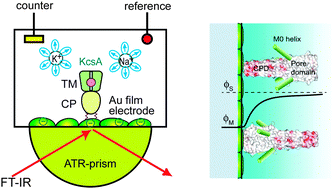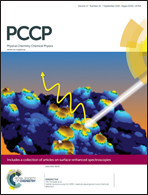Surface-enhanced IR absorption spectroscopy of the KcsA potassium channel upon application of an electric field
Abstract
Surface-enhanced IR absorption spectroscopy (SEIRAS) is a powerful tool for studying the structure of molecules adsorbed on an electrode surface (ATR-SEIRA). Coupled with an electrochemical system, structural changes induced by changes in the electric field can be detected. All the membrane proteins are subjected to the effect of membrane electric field, but conformational changes at different membrane potentials and their functional relevance have not been studied extensively except for channel proteins. In this contribution, background information of potential-dependent functional and structural changes of a prototypical channel, the KcsA channel, is summarized, and SEIRAS applied to the KcsA channel under the application of the potential is shown. The potassium channels allow K+ to permeate selectively through the structural part called the selectivity filter, in which dehydrated K+ ions interact with backbone carbonyls. In the absence of K+, the selectivity filter undergoes conformational changes to the non-conductive collapsed conformation. To apply the electric field, the KcsA channels were fixed on the gold surface in either upside or reverse orientation. The SEIRA spectrum in K+ or Na+ solution revealed both backbone structural changes and local changes in the OCO-carboxylate groups. Upon application of the negative electric field, the spectrum of OCO was enhanced only in the K+ solution. These results indicate that the negative electric field accumulates local K+ concentration, which turned the collapsed filter to the conductive conformation. ATR-SEIRA serves as an unprecedented experimental system for examining membrane proteins under an electric field.

- This article is part of the themed collection: Surface-enhanced spectroscopies

 Please wait while we load your content...
Please wait while we load your content...